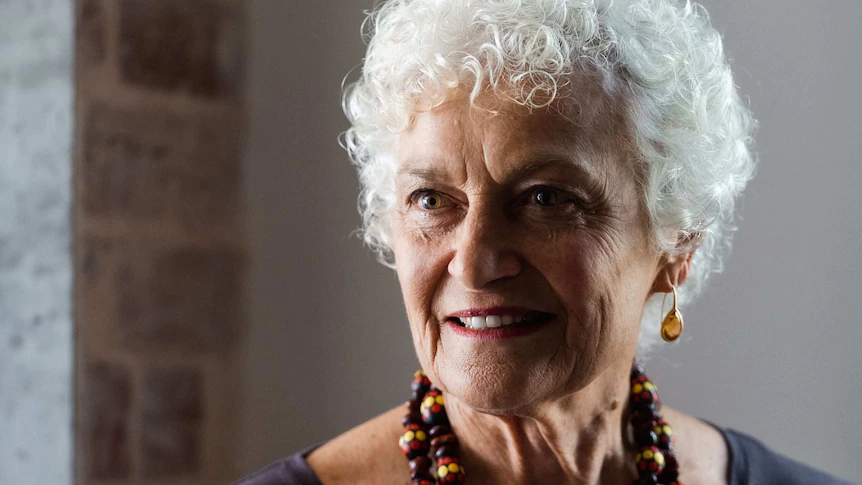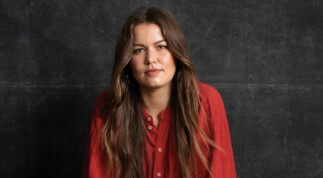Photo: Hugh Sando, ABC News
Prof. Fiona Stanley, renowned epidemiologist and former Australian of the Year, is on a mission in 2023 to ensure the referendum for an Aboriginal and Torres Strait Islander Voice to parliament gets over the line.
Last week, she joined the Together, Yes team — Mary Crooks AO (Executive Director, Victorian Women’s Trust; and project director, Together, Yes); and Phil Saunders (proud Bunganditj, Gunditjmara, Narungga man, artist and interim CEO of Tandanya) — touring Western Australia to deliver free Community Info Sessions about Together, Yes. Created by the Victorian Women’s Trust over twenty years ago to enable everyday people to meaningfully contribute significant social issues, Together, Yes is a grassroots “Kitchen Table Conversations” movement in support of Yes.
At each community gathering, Fiona spoke alongside Mary and Phil, passionately explaining to audiences the reasons why she unequivocally supports the Voice. We spoke to Fiona in more depth to better understand her position on the Voice — here’s what she had to say.
Hi Fiona. From what perspective are you approaching the Voice referendum?
As a paediatric epidemiologist, I’m coming from the evidence, and it’s been a privilege to have spent the last nearly forty years (I’m pretty old) with Aboriginal researchers who have shared this evidence with me.
Could you talk a little bit about the Institute you founded in Perth?
We set up the Telethon Kids Institute here in Perth in 1990. I went to the Aboriginal communities, and medical services, and I said, “What do you want us to do for you?”. They said, “We want you to be our mother”.
Well, a mother gives her children all the knowledge, the funds, the capacity, and the ability to cope with the world that’s very tough out there. So, we trained up about 30-35 PhDs in a whole range of research fields, right across health, medicine, education, child protection, justice and wellbeing. It’s all about community participation and action. So, now I have example after example of very hard data to say that when Aboriginal people are in control of their own services, they work.
From your experience at the Institute, what problems do you think the Voice offers a solution to that are failing at the moment? Why are the current solutions failing?
The Voice offers what the Canberra and capital city models do not. Only 18% of Aboriginal people actually live in remote communities. Most Aboriginal people live in cities, and urban towns and centres. But they still experience a huge health gap, in spite of the fact they’re close to the best medical services in the world. So government initiated and implemented services fail because they do not understand the Aboriginal circumstances and most are racist. And would you trust the department that took your children away? Would you trust the hospital that refused treatment and your child died? Would you trust a justice system that kills so many Indigenous youth?
So, my anguish is that time after time, we have given the bureaucrats and the politicians the control over Aboriginal services for systemic problems. These government policies and practices cost a huge amount of money. On the whole, past government solutions have been either useless, or in the case of the Northern Territory Intervention, incredibly damaging to Aboriginal people. Aboriginal people are superbly innovative, and I have learned so much from them.
What do you want to say to those who are doubting the importance of bringing in a “Yes” vote to the Voice referendum?
The previous Liberal government defunded the 75 Aboriginal community controlled early childhood and family centres across Australia. And now, they wonder why we are seeing all these kids going off the rails. It is just unbelievable that politicians do not understand these pathways. Aboriginal people do and have the best solutions. In every community I’ve been in, they have the solutions, most underfunded or are pilot studies! So even if you don’t care about humanity, or social justice, if you just want a cost-effective set of actions, support the Voice. Because it will be so powerful.
Do you have any final thoughts or comments you’d like to leave with our readers?
I’m going to leave you with one thing. During the COVID pandemic, Aboriginal people had the best response in the world. They had a voice from NACCHO (National Aboriginal Community Controlled Health Organisation) in Canberra, right down to communities across every state and territory and community. Aboriginal people demanded what they needed, because they knew what they needed. The H1N1 flu epidemic in 2009 nearly killed so many Elders.
So they knew, and people in their communities were trained. Aboriginal and Torres Strait Islander people had six times fewer cases than non-Indigenous people. This is the best result in the world, let alone Aboriginal (the Navajos, the Brazilians, were decimated). And here, our press didn’t want to hear about it! No, they don’t like good news stories about Aboriginal people.
Later of course, when the vaccines failed and communities were no longer closed — these were not decisions by the people who really knew, and lived every day in those communities — the rate of infection went up, and the deaths went up. But every element of this story is an incredible example of what the Voice will do.
Another quick example — I attended a conference two weeks ago in Perth where two hundred Aboriginal women presented on how they have set up traditional ways of birthing, in collaboration with the modern medicine that they need. Evaluation has shown remarkably better baby outcomes! It’s absolutely phenomenal! It shows us that at every level in Australia, we’ve got these networks of Aboriginal people who are there, ready to run with the Voice. All we need to do is get it up.
The Victorian Women’s Trust is proud to be standing alongside Prof. Fiona Stanley and others from the Yes Alliance, joining forces for a common cause that will undoubtably shape our nation for generations to come. To find out how you can join Together, Yes visit: togetheryes.com.au

